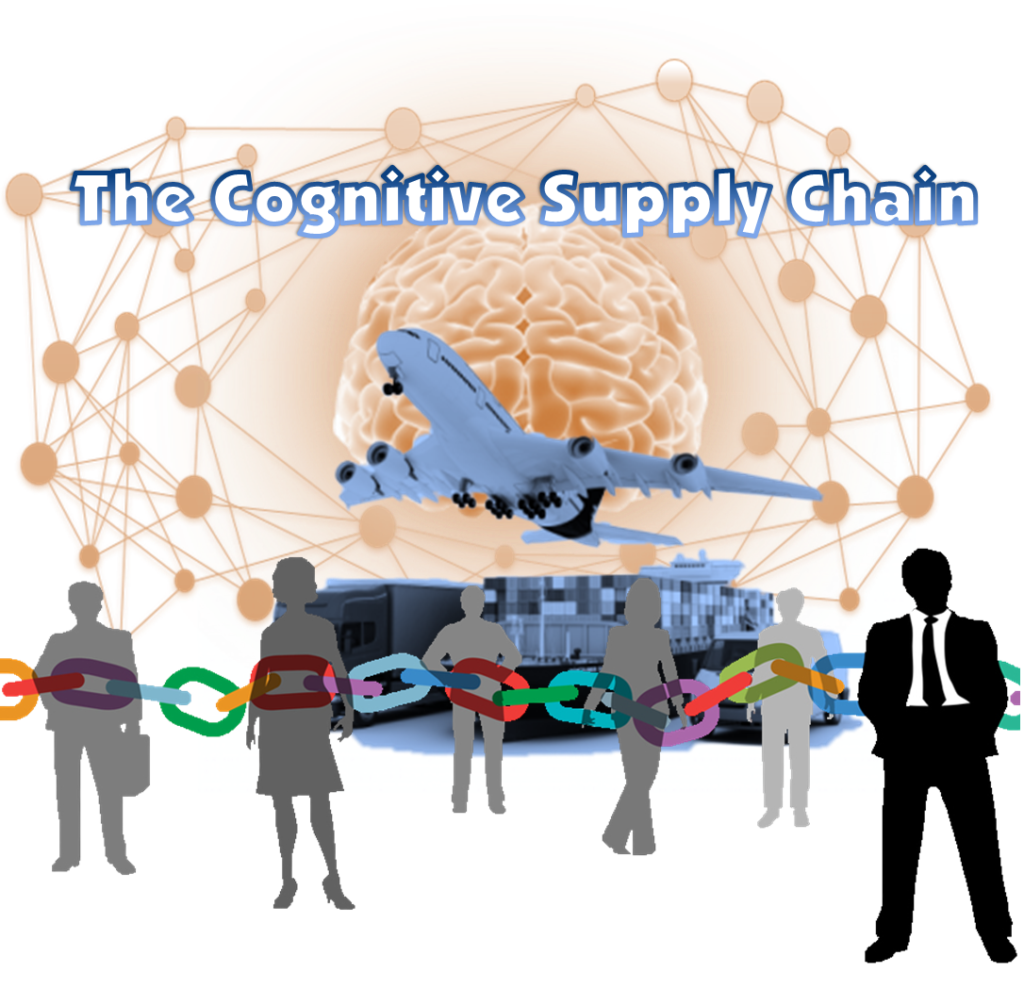This coming September Enterra Solutions® is one of the sponsors for the Supply Chain Insights 3rd Annual Supply Chain Summit. The theme for this year’s Summit is: “Imagine: The Supply Chain That Could Be.” The word “imagine” is powerful. It releases us from daily constraints. It stretches our thinking. It sparks our creative juices. Imagination can help us perceive a situation in which we would like to find ourselves; it just doesn’t tell us how to get from here to there. When I imagine the supply chain that could be, I see a cognitive supply chain that involves corporate digital transformation, the Internet of Things, and cognitive computing.
Digital Transformation
The discussion about “what a supply chain could be” needs to start at the enterprise level. As Lora Cecere (@lcecere), founder of Supply Chain Insights, has written, “The supply chain IS Business, not a department within a business.”[1] If you want to talk about the enterprise of the future, you have to talk about the digital enterprise. Paul Willmott (@WillmottPaul), leader of McKinsey Digital, writes, “It’s safe to assume virtually all companies use digital technology in some form or another. Yet getting beyond obvious and small applications of technology to drive the creation of truly ‘digital enterprises’ is vital — and presents a challenge for executives.”[2] Generally speaking a digital enterprise is an organization that leverages digital technology as a competitive advantage in its internal and external operations. Deloitte puts it this way, “Maintaining a competitive edge means building a Digital Enterprise that’s capable of taking full advantage of social, mobile, web, cloud and analytic technologies. … It requires integration of people, processes, and capabilities to deliver an omni-channel experience.” Whenever one speaks of digitization, what they are really talking about is generating data — often referred to as Big Data — and its subsequent analysis. The more data an enterprise generates (or needs to analyze) the more challenging the situation becomes. The picture gets even more challenging when you add in the fact that many supply chains extend across the globe and have become very complex. Even using the latest technologies, dealing with complexity can be difficult. One way of dealing with complexity is to automate processes so that decision makers can exercise management-by-exception. This management mode allows decision makers to free up time and resources that can be focused on achieving business objectives.
The Internet of Things
In order to automate business processes, enterprises need to adopt computer technologies that not only do what they’re asked to do but learn as they go. In order to learn, artificial intelligence systems need data — and lots of it. That’s where the Internet of Things (IoT) enters the picture. General Electric believes that IoT will have such a significant impact on the business landscape that it calls it the Industrial Internet. The amount of data that will be generated by the IoT in the years to come will dwarf what we today call “Big” Data. Today what appears to be oceans of data will seem like small ponds in the years ahead. Mark Jaffe, CEO of Prelert, insists, “[The] IoT will produce a treasure trove of big data — data that can help cities predict accidents and crimes, give doctors real-time insight into information from pacemakers or biochips, enable optimized productivity across industries through predictive maintenance on equipment and machinery, create truly smart homes with connected appliances and provide critical communication between self-driving cars. The possibilities that IoT brings to the table are endless.”[3] The endless possibilities to which Jaffe refers will only become possible when cognitive computing solutions are implemented.
Cognitive Computing
Diego Lo Giudice (@dlogiudice), an analyst with Forrester, believes that a quarter of a century from now cognitive computing will have replaced artificial intelligence as the term most used to describe smart machines.[4] Lo Giudice and his colleagues at Forrester conclude, “Cognitive systems are creeping into commercial relevance beginning with high-end customer engagement applications in financial services, healthcare, and retail and will become ubiquitous in mainstream scenarios and the Internet of Things within five years.” In Accenture’s latest technology vision entitled “From Digitally Disrupted to Digital Disrupter,” Accenture analysts state that cognitive computing will provide the “ultimate long-term solution” for many business challenges. They write:
“What if … machines could be taught to leverage data, learn from it, and, with a little guidance, figure out what to do with it? That’s the power of machine learning — which is a major building block of the ultimate long-term solution: cognitive computing. Rather than being programmed for specific tasks, machine learning systems gain knowledge from data as ‘experience’ and then generalize what they’ve learned in upcoming situations. Cognitive computing technology builds on that by incorporating components of artificial intelligence to convey insights in seamless, natural ways to help humans or machines accomplish what they could not on their own. At its most advanced, cognitive computing … masks complexity by harnessing the power of data to help business users ask and answer strategic questions in a data-driven way.”
The bottom line is that, if you want to transform into a digital enterprise, the full realization of that goal won’t be achieved without the implementation of cognitive computing solutions.
The Cognitive Supply Chain
Both the downstream and upstream portions of the supply chain can benefit from cognitive computing. The most obvious example of how cognitive computing can help is through better visibility. Visibility is the sine qua non of a better supply chain. Cecere rightfully stresses that visibility, at a minimum, needs to encompass a supplier’s supplier all the way to a customer’s customer. Manual processes are simply incapable of monitoring all of the sources of data required to achieve good visibility. In an ideal world, secure information sharing arrangements with supply chain partners will be concluded so that the IoT can be used to automatically keep the system informed. Armed with the right information, a cognitive supply chain will manage routine processes and decisions and will only need to alert decision makers when anomalies are detected. With better visibility, forecasts can be improved, out of stock situations can be avoided, chargebacks can be reduced, and productive inventory can be increased.
Two other important areas where cognitive computing is poised to make a difference are supply chain risk management and predictive analytics. Perhaps no area requires more variables to be analyzed than supply chain risk. All of the data involved in normal supply chain visibility must be monitored along with current events, environmental conditions, political unrest, natural disasters, and so forth. Emerging and long-term patterns must be considered. Cognitive computing can help make connections between variables and provide better alerting than manual processes. Monitoring is essential because companies can’t influence or control many of the potential sources of disruption. Concerning predictive analytics, most analysts see this as a game-changer. Cognitive computing can analyze many more variables than current systems and are, therefore, able to make predictions with greater accuracy than the forecasts many businesses now use. Better predictions can help eliminate things like the dreaded Bullwhip Effect. Predictions generated from data will help improve decision-making in every department of an enterprise. Lo Giudice concludes, “What’s surfacing from Cognitive computing these days is only the tip of the iceberg, much more will be coming. Cognitive computing has long-term goals, spanning over a decade or more. It will solve a class of new problems we have not even yet thought of. … If you get involved in cognitive computing, you should get in for the long run. Yes you can get some spot business solutions going, but the big reward is going to take more investment and time.” In my opinion, the big reward will be a cognitive supply chain.
Footnotes
[1] Lora Cecere, “Sage advice? Only for turkeys.” eft, 1 February 2013.
[2] Paul Willmott, “The Digital Enterprise,” Insights & Publications, November 2013.
[3] Mark Jaffe, “IoT Won’t Work Without Artificial Intelligence,” Wired, 12 November 2014.
[4] Diego Lo Giudice, “Three assumptions for why the next generation of software innovation will be cognitive,” Computerworld UK, 28 August 2014.





